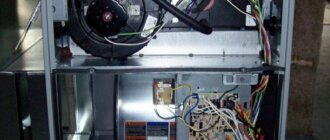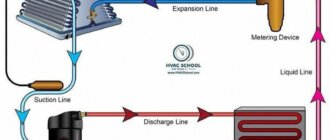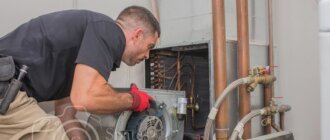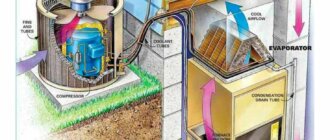HVAC Basics Every Homeowner Should Know
As a homeowner, it’s important to have a basic understanding of your home’s HVAC system. From the type of system you have to its efficiency rating and maintenance needs, having this knowledge can help prolong the life of your HVAC unit and save you money in the long run.
In this homeowner guide, we’ll cover everything you need to know about HVAC basics, including types of systems, efficiency ratings, maintenance tips, and more! So sit back, relax, and get ready to become an expert on all things HVAC.
What is HVAC?
HVAC stands for Heating, Ventilation, and Air Conditioning. It is a system that regulates the temperature, air quality, and humidity of indoor spaces. In simple terms, HVAC systems help to keep you comfortable in your home or office year-round.
The heating aspect of HVAC provides warmth during cold months while the cooling component keeps things cool during hot summer days. Ventilation ensures fresh air circulation while also removing excess moisture from the atmosphere.
Today’s modern homes are designed with energy efficiency in mind and HVAC systems play an important role in this regard. They can significantly reduce energy bills by using less power to maintain optimal temperatures throughout the seasons.
In addition to providing comfort and saving money on utility costs, properly functioning HVAC systems can also improve indoor air quality by filtering out pollutants like dust mites or allergens that may be harmful to human health.
Understanding what an HVAC system is can help homeowners make informed decisions about their home’s heating and cooling needs.
Purpose of HVAC Systems
The primary purpose of an HVAC (Heating, Ventilation and Air Conditioning) system is to control the indoor air temperature, humidity level and air quality. It ensures that your home or office space remains comfortable and healthy all year round.
During the hot summer months, the HVAC system cools down the indoor air by removing heat from it through a refrigerant cycle. On the other hand, during cold winter months, it heats up the indoor air using a furnace or boiler.
Apart from temperature regulation, HVAC systems also help in ensuring adequate ventilation by bringing in fresh outdoor air inside while exhausting stale indoor air outside. This ensures proper circulation of clean and healthy air throughout your living space.
Moreover, modern HVAC units come with advanced filtration systems that filter out allergens like dust mites and pet dander along with pollutants like smoke particles and volatile organic compounds (VOCs).
An efficient HVAC system provides more than just comfort – it creates a safe and healthy environment for you to live in.
Different Types of HVAC Systems
HVAC (Heating, Ventilation, and Air Conditioning) systems come in different types to meet the unique needs of every home. The three main types are central air conditioners and heat pumps, furnaces and boilers, and ductless mini-split systems.
Central air conditioners cool homes by circulating cold air through the ducts while heat pumps do a dual function of heating or cooling homes by transferring hot or cold air between indoor and outdoor units. Furnaces use gas or oil to produce heat that is distributed through ducts while boilers use water heated in a tank to provide warmth throughout the house.
Ductless mini-split systems don’t require ductwork for installation as they use an outside unit connected to one or more inside units mounted on walls. These systems offer zoning options that allow homeowners to control temperatures in each room separately.
Choosing the right HVAC system depends on various factors such as climate conditions, size of your home, cost considerations, energy efficiency ratings among others. It’s important you consult with an expert who can advise you on which type meets your specific needs before making a purchase decision.
Central Air Conditioners and Heat Pumps
Central air conditioners and heat pumps are two of the most common types of HVAC systems found in homes. While they both serve the purpose of cooling your home, they operate differently.
Central air conditioning systems work by distributing cool air throughout your home through a system of ducts. The process starts with an outdoor unit that houses the compressor, which cools down refrigerant before it is circulated indoors to cool the air.
Heat pumps, on the other hand, can be used for both heating and cooling purposes. They work by transferring heat between indoor and outdoor units using refrigerant. During summer months, heat is transferred from inside your home to outside; during winter months, this process is reversed to bring warmth into your living space.
While central AC systems may offer more consistent cooling power than heat pumps, especially in hot climates or larger homes, heat pumps can provide a more energy-efficient option for those who live in milder climates or smaller spaces.
It’s important to note that regular maintenance is crucial for both types of systems to ensure optimal performance and longevity.
Furnaces and Boilers
Furnaces and boilers are the two most common types of heating systems found in residential homes. Furnaces work by blowing warm air through ducts, while boilers use water to heat a home through radiators or baseboard heaters.
Furnaces typically run on natural gas, propane, or electricity, and can have efficiencies ranging from 80% to over 95%. They come in different sizes to accommodate various home sizes and layouts. Some furnaces also have additional features like two-stage operation which helps maintain consistent temperatures throughout the house.
Boilers also offer high energy efficiency levels with efficiencies ranging from 82% to over 95%. They heat water that is then circulated throughout the house via pipes or radiators. Boilers can be fueled by natural gas, oil, or propane.
Both furnaces and boilers require routine maintenance such as changing filters, inspecting burners or pilot lights for proper ignition and flame characteristics as well as ensuring proper ventilation. It’s important to hire a licensed professional technician for any maintenance tasks beyond basic DIY upkeep.
Choosing between a furnace and boiler comes down to personal preference based on your specific needs including location, fuel availability/costs, and overall comfort preferences.
Ductless Mini-Split Systems
Ductless mini-split systems are an increasingly popular HVAC option for homeowners looking for a more flexible and energy-efficient way to heat and cool their homes. Unlike traditional central air conditioning systems, which rely on ductwork to distribute conditioned air throughout the home, ductless mini-splits use individual air handlers installed in each room or zone.
One of the main advantages of ductless mini-splits is that they offer zoned heating and cooling capabilities. This means you can set different temperatures in different rooms or areas of your home, providing greater comfort control and potentially reducing your energy bills.
Another benefit of ductless mini-splits is that they are typically much easier to install than central air conditioners or furnaces. Since there’s no need for costly ductwork installation, the process is generally quicker and less disruptive.
Despite these advantages, there are some potential drawbacks to consider when deciding whether a ductless mini-split system is right for your home. For example, while they may be more efficient than other types of HVAC systems on paper, actual performance can vary depending on factors like climate and usage patterns.
If you’re looking for a versatile and efficient way to keep your home comfortable year-round without relying on traditional forced-air systems with bulky ducts running through your walls and ceilings, it’s worth considering a high-quality ductless mini-split system as an alternative solution.
Understanding HVAC Efficiency
When it comes to choosing an HVAC system, efficiency is a crucial factor to consider. The more efficient the system, the less energy it will consume and the lower your utility bills will be.
SEER (Seasonal Energy Efficiency Ratio) rating measures how efficiently air conditioning systems operate during warm seasons. A high SEER rating means that the system uses less energy to cool your home.
AFUE (Annual Fuel Utilization Efficiency) rating measures how efficiently furnaces perform in converting fuel into heat over a year’s time. A higher AFUE rating translates to greater efficiency.
HSPF (Heating Seasonal Performance Factor) ratings measure the heating output of heat pumps relative to their electricity usage during one season. High HSPF ratings mean superior energy efficiency for heating purposes.
It’s important to note that investing in a highly-rated efficient unit may cost more initially but can save you money in long-term operating costs. Understanding these terms and ratings can help you make informed decisions when selecting an efficient HVAC system for your home.
Essential HVAC Maintenance
Essential HVAC maintenance is crucial to ensure that your HVAC system runs efficiently and effectively. Regular maintenance can help extend the life of your system, prevent breakdowns, and save you money in the long run.
There are two types of essential HVAC maintenance: routine check-ups and DIY tasks. Routine check-ups should be performed by a professional at least once per year. During these visits, a technician will inspect your system for any potential issues or inefficiencies.
DIY tasks include things like changing air filters regularly, cleaning vents and ducts, and keeping outdoor units free from debris. These tasks can be done on a more frequent basis than routine check-ups to keep your system running smoothly between professional visits.
Ignoring essential HVAC maintenance can lead to expensive repairs or even the need for premature replacement of your entire system. It’s always better to take preventative measures rather than wait until something goes wrong.
By investing in regular upkeep of your HVAC system, you’ll benefit from improved comfort levels in your home all year round while also saving money on energy bills over time.
Routine Check-ups
Routine check-ups are an important part of HVAC maintenance. As a homeowner, it’s essential to schedule regular inspections with a professional technician, at least once a year.
During these routine check-ups, the technician will assess your system’s performance and identify any underlying issues that may affect its efficiency or safety. They’ll also clean and replace filters as necessary, inspect electrical connections and wiring, lubricate moving parts, and tighten loose components.
If you notice any unusual sounds or smells coming from your HVAC system in between appointments, don’t hesitate to call in for additional repairs. Catching small problems before they become major ones can save you time and money down the road.
Keep in mind that preventative maintenance is crucial for extending the lifespan of your HVAC system. Regular check-ups ensure that your unit runs smoothly all year round without breaking down unexpectedly during peak seasons when you need it most.
DIY Maintenance Tasks
DIY maintenance tasks can help keep your HVAC system running smoothly and efficiently. One of the most important tasks is changing the air filter regularly. A clogged filter can reduce airflow, causing your system to work harder and use more energy.
Cleaning the outdoor unit is another task that you can tackle on your own. Remove any debris or leaves that have accumulated around it and clean the fins with a soft brush or vacuum cleaner.
Checking for leaks in ductwork is also an important DIY task. Leaks can cause hot or cold air to escape before it reaches its intended destination, resulting in wasted energy and higher utility bills.
Adjusting your thermostat settings seasonally can help save money on heating and cooling costs. Lowering it a few degrees during winter months and raising it during summer months will allow you to stay comfortable while reducing energy consumption.
By performing these DIY maintenance tasks, you’ll be able to prolong the lifespan of your HVAC system while keeping operating costs down.
When to Call a Professional
While some HVAC maintenance tasks can be done by homeowners, there are certain situations where it’s best to call a professional. Here are some instances when you should definitely seek the help of an HVAC technician.
Firstly, if your system is making strange noises or emitting unusual smells, this could indicate a serious issue that requires professional attention. Attempting to diagnose and fix the problem yourself may lead to further damage or even create safety hazards.
Secondly, if your HVAC system has completely stopped working, it’s time to call in a pro. Whether it’s due to electrical issues or mechanical failures, attempting DIY repairs could cause more harm than good.
Thirdly, if you notice a sudden increase in energy bills without any explanation such as changes in usage habits or rates, then you might need expert assistance. An experienced technician can diagnose and repair any inefficiencies within the system that may be causing high utility costs.
Lastly but not least important one: If your air conditioning unit is blowing warm air rather than cool air despite adjusting thermostat settings, then consulting with an expert would be a wise decision. They’ll have the knowledge and tools necessary for identifying various potential causes from refrigerant leaks to faulty compressors which could otherwise worsen over time leading to costly breakdowns and replacements down the line.
In summary, having regular check-ups on your HVAC systems is always recommended, but calling professionals at the right times will save money on a long-term basis while also ensuring optimal performance throughout its lifespan.
Lifespan of HVAC Systems
The lifespan of an HVAC system is dependent on several factors. One of the most crucial ones is regular maintenance. With proper maintenance, HVAC systems can last for up to 15-20 years or even more.
However, various factors affect the longevity of these systems including usage patterns, quality of installation and materials used during installation, as well as environmental conditions.
Usage patterns are a vital consideration when it comes to determining how long your HVAC system will last. If you use your heating and cooling units frequently throughout the year, they may wear out faster than those that only run seasonally.
Proper installation with high-quality equipment also plays a significant role in ensuring an extended lifespan for your HVAC system. An improperly installed unit can lead to frequent breakdowns and force you to replace parts regularly.
Environmental factors such as humidity levels and air quality can also impact how long an HVAC system lasts. High humidity levels can corrode metal components while poor air quality due to dust or debris buildup might clog filters and reduce efficiency over time.
There’s no definitive answer regarding precisely how long an HVAC unit will last since different variables come into play. However, regular maintenance combined with professional installations using high-quality equipment could significantly extend its lifespan!
Factors Affecting Lifespan
There are several factors that can affect the lifespan of your HVAC system, some of which are within your control and others that aren’t. One factor is the quality of installation, as a poorly installed system can lead to premature wear and tear on components.
Another factor is usage patterns, as systems that are used more frequently may have a shorter lifespan than those used less often. Climate also plays a role, as extreme temperatures or humidity levels can cause strain on the system.
Regular maintenance is essential in prolonging the life of your HVAC system. Neglecting routine maintenance tasks such as changing air filters and cleaning coils can result in decreased efficiency and an increased risk for breakdowns.
In addition to maintenance, choosing high-quality equipment from reputable brands can contribute to a longer lifespan for your HVAC system. However, even with proper installation and regular maintenance, normal wear and tear will eventually take its toll on any HVAC system.
By being aware of these factors affecting lifespan, homeowners can take steps to ensure their systems last as long as possible through proper care and attention.
Conclusion
As a homeowner, understanding HVAC basics is crucial for maintaining the proper functionality and efficiency of the system. By knowing the types of systems available, their purpose, and their maintenance requirements, you can ensure that your home remains comfortable year-round while also keeping energy costs low.
Regular maintenance by professionals and homeowners alike can extend the lifespan of an HVAC system significantly. Keep in mind that different factors such as usage habits or climate conditions affect its longevity.
Don’t hesitate to contact a professional when necessary. Proper installation and repair work will help prevent costly damage to your home’s heating and cooling systems in the future. With these tips in mind, you’ll be better equipped to make informed decisions about your HVAC system’s care now so that it continues working well into the future.
Recent Queries:





